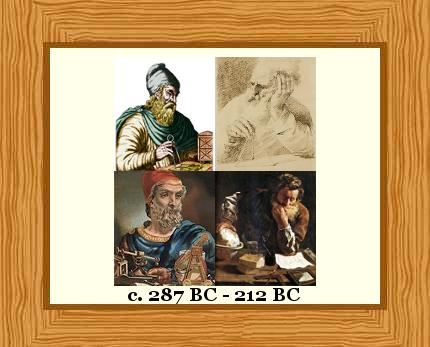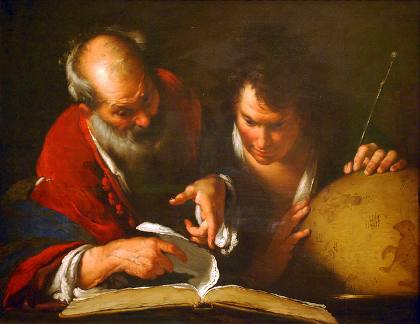Archimedes was, arguably, the world’s greatest scientist – certainly the
greatest scientist of the classical age. He was a mathematician,
physicist, astronomer, engineer, inventor, and weapons-designer. As we
shall see, he was a man who was both of his time, and far ahead of his
time.

Artists’ ideas of Archimedes. We do not know what he really looked like.
Archimedes was born in the Greek city-state of Syracuse on the island
of Sicily in approximately 287 BC. His father, Phidias, was an
astronomer.
Archimedes may also have been related to Hiero II, King of Syracuse.
Quick Guide – Archimedes’ Greatest Achievements
In the 3rd Century BC, Archimedes:
• invented the sciences of mechanics and hydrostatics.
• discovered the laws of levers and pulleys, which allow us to move heavy objects using small forces.
• invented one of the most fundamental concepts of physics – the center of gravity.
• calculated pi to the most precise value known. His lower limit for pi was the fraction 22⁄7. This value was still in use in the late 20th century, until electronic calculators finally laid it to rest.
• discovered and mathematically proved the formulas for the volume and surface area of a sphere.
• showed how exponents could be used to write bigger numbers than had ever been thought of before.
• proved that to multiply numbers written as exponents, the exponents should be added together.
• invented the Archimedean Screw to pull water out of the ground – the device is still used around the world.
• infuriated mathematicians who tried to replicate his discoveries
18 centuries later – they could not understand how Archimedes had
achieved his results.
• directly inspired Galileo and Newton when they read his work to
begin the modern scientific revolution after the Renaissance.
Archimedes’ surviving works (tragically, many have been lost) finally
made it into print in 1544. Leonardo da Vinci was lucky enough to have
seen some of the hand-copied works of Archimedes before they were
eventually printed.
• was one of the world’s first mathematical physicists, applying the advanced mathematics he developed to the physical world.
• was the first person to apply lessons from physics – such as the law of the lever – to solve problems in pure mathematics.
• invented war machines such as a highly accurate catapult, which
stopped the Romans conquering Syracuse for years. It’s now believed he
may have done this by understanding the mathematics of projectile
trajectory.
• became famous throughout the ancient world for his brilliant mind –
so famous that we cannot be sure that everything he is said to have
done is true.
• inspired what we now believe are myths including a mirror system to
burn attacking ships using the sun’s rays, and jumping from his bath,
and running naked through the streets of Syracuse shouting ‘Eureka’
meaning ‘I’ve found it’ after realizing how to prove whether the king’s
gold crown had silver in it.
Early Days and Greek Culture
The ancient Greeks were the first people to do real science and recognize science as a discipline to pursue for its own sake.
Although other cultures had made scientific discoveries, these were
made for thoroughly practical reasons, such as how to build stronger
temples or predict when the heavens would be right for planting crops or
getting married.
Today, we’d describe much of the Ancient Greeks’ work as blue skies scientific research.
They investigated the world for the sheer pleasure of adding to their
knowledge. They studied geometry for its logic and its beauty. With no
practical purpose in mind, Democritus proposed that all matter was made
of tiny particles called atoms and that these atoms could not be split
into smaller particles. He produced logical arguments for his idea.
Archimedes was born into this Greek scientific culture. He must have
felt the influence particularly strongly, flowing from his astronomer
father. We know his father was an astronomer, because Archimedes tells
us in his work The Sand Reckoner. Writing about another
astronomer’s estimates of the sun’s size, he says: “Pheidias, my father,
said the sun was twelve times bigger.”
Archimedes spent most of his life in Syracuse. As a young man, he
furthered his education in the city of Alexandria in Egypt, where
Alexander the Great’s successor, Ptolemy Lagides, had built the world’s
greatest library.
The Library of Alexandria, with its meeting rooms and lecture halls,
had become the focal point for scholars in the ancient world.
Some of Archimedes’ work is preserved in copies of the letters he
sent from Syracuse to his friend Eratosthenes. Eratosthenes was in
charge of the Library of Alexandria, and was no mean scientist himself.
He was the first person to calculate the size of our planet accurately.

An
artist’s view of Archimedes’ friend Eratosthenes teaching in the
Library of Alexandria. Of course, the books in the library would have
been scrolls, rather than the codex style shown here.
Immersed in the scientific culture of Ancient Greece, Archimedes
blossomed into one of the finest minds our world has known. He was the
Einstein of his time, or perhaps we should say that Einstein was the
Archimedes of his time.
Tidak ada komentar:
Posting Komentar